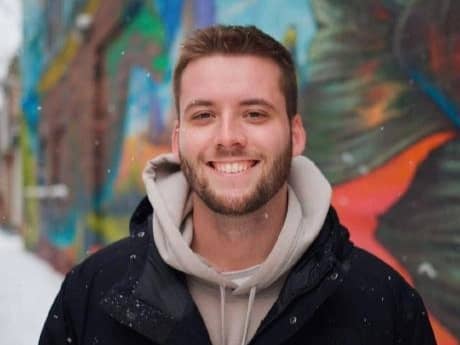Subscribe to wiki
Share wiki
Bookmark
Lucas Manuel
The Agent Tokenization Platform (ATP):Build autonomous agents with the Agent Development Kit (ADK)
0%
Lucas Manuel
Lucas Manuel is a software engineer specializing in smart contract development and decentralized finance (DeFi) systems. He is a co-founder of Spark and has played a role in the architecture and security of various blockchain protocols. [3]
Education
Manuel graduated from Queen’s University in 2018, where he earned a Bachelor of Science in Engineering with a focus on Civil Engineering. [1]
Career
Manuel began his career as a swim instructor and lifeguard in Toronto from 2012 to 2014. In 2015, he worked as a summer assistant on a high-rise residential construction site, where he managed technical documentation, material logistics, and inspections. The following year, he interned at the Canada Pension Plan Investment Board, where he developed a web app for strategy performance visualization and backtested an automated trading algorithm using machine learning.
In 2017, he joined RBC’s Amplify program, where he worked as a developer on a QR-enabled e-transfer prototype within the bank’s mobile app. He also co-founded the Queen's Blockchain Innovation Community, where he organized events and lectures on blockchain technology. During the same year, he managed the design and construction of a large wooden structure for a university event, coordinating budgeting, logistics, and on-site assembly.
In 2018, he contributed as a data science advisor to Imusify, proposing a blockchain-based music recommendation system. At EY, he spent two years developing blockchain applications, smart contracts, APIs, and microservices for clients, deploying private Ethereum blockchains, and building full-stack implementations.
By 2020, he joined MakerDAO as a smart contracts engineer, contributing to the development and governance mechanisms of the Multi-Collateral DAI system, including collateral onboarding, liquidation mechanisms, and autonomous payment contracts. Later that year, he became the technical lead for smart contracts at Maple, overseeing multiple mainnet deployments of DeFi lending infrastructure. His work included protocol upgrades, token implementations, and contract migrations that facilitated billions in originations without reported smart contract vulnerabilities.
Since May 2023, he has been a co-founder at Phoenix Labs, based in Toronto. He also contributes to the design and security of Spark's architecture. [2]
Interviews
Spark
On the Stable Pod podcast, hosts Juan Isl and Gustav Arinoft interviewed Manuel about his journey and the evolution of Spark, which initially started as a lending platform, into a comprehensive liquidity layer in decentralized finance (DeFi). He recounted his background, including his time at MakerDAO and Maple Finance, before co-founding Phoenix Labs. He discussed Spark's development, its governance model, liquidity strategies, and the competitive landscape of DeFi, emphasizing the shift towards sub-DAO structures to enhance capital allocation and governance efficiency. The conversation highlighted the importance of aligning incentives among various sub-DAOs, ongoing risk management strategies, and innovative approaches that Spark was implementing to optimize capital deployment across different protocols. The hosts expressed their enthusiasm for the potential growth and future developments of Spark within the DeFi ecosystem. [11]
Presentations
MakerDAO Endgame
In a presentation at the Toronto Ethereum Developers Meetup, Manuel discussed MakerDAO's "Endgame," which aimed to overhaul the existing system to enhance efficiency, resilience, and participation in governance. He outlined the challenges faced by MakerDAO, including complexities in governance, voter apathy, and slow growth, particularly related to onboarding real-world assets. To address these issues, he introduced the concept of "sub-DAOs," which would operate under MakerDAO with their own governance structures and community, allowing for greater specialization and competition.
Manuel also highlighted the integration of artificial intelligence to improve governance accessibility and discussed a new allocation system to manage the distribution of the stablecoin DAI, intended to streamline operations. He emphasized the importance of reducing governance complexity and increasing system resilience through new mechanisms to protect against insolvency. Overall, the presentation showcased a forward-looking vision aimed at enhancing MakerDAO's structure and functionality in the decentralized finance space. [10]
See something wrong?
The Agent Tokenization Platform (ATP):Build autonomous agents with the Agent Development Kit (ADK)
